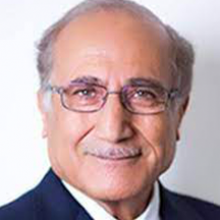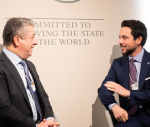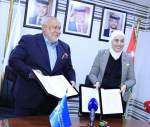You are here
A trip to Iran
Dec 03,2018 - Last updated at Dec 03,2018
Accompanying Taher Al Masri, I travelled on the 23rd of November to Tehran in order to attend the International Islamic Unity Conference which focused on Jerusalem. This was my second trip to Iran in the last two years. The conference was attended by 900 dignitaries, clerics and politicians. There were representatives from 72 countries from Asia, Africa, Europe and the Americas.
The attendees listened to speeches from Iranian Supreme Leader Ayatollah Ali Khamenei, Iranian President Hassan Hassan Rouhani and Iran’s Islamic Consultative Assembly Speaker Ali Larijani.
All of them conveyed similar themes. All of them reflected the strict position regarding Israel as the arch-enemy of the Islamic Ummah. To them, Israel is doomed and the Palestinians’ right of return and recapturing all of Palestine is an unavoidable objective which will be realised.
Moreover, Iran is being targeted by the current US administration. It was confirmed that economic sanctions are hurting, but surmountable, and carry the seeds of self-reliance. Yet, they promised that nobody in the Gulf would be allowed to export oil or gas if Iran was denied this right.
They all praised Hizbollah as a military power to be contented with, and one which is growing. This sentiment was echoed by Sheikh Naeem Qassim, Hassan Nasrallah’s deputy and who regularly attends this Islamic conference organised by the World Forum for Proximity of Islamic Schools of Thought.
Although Jerusalem is a central issue, it is a long fight. Instead they thought that Yemen deserves the utmost attention in the light of human tragedy represented by the size of civilian casualties and the toll among children. According to a Houthi top official who attended the conference, a quick, peaceful solution should be reached to maintain Yemen’s integrity and unity. He asserted to me that most of the victims in Yemen belong to the Shafii sect, not the Zaidi sect. He never used the words Shiite and Sunni of Yemen. “We are Zaidis, and we are not Jafaris.”
To the Iranian leaders and politicians, both Syria and Iraq are not yet fully resolved. As long as there are Daesh or Nusra Front terrorists, the war is far from over. However, they all believe that amicable political solutions guaranteeing the unity of both countries are the only safe way out.
As far as Jordan is concerned, Masri was informed by Kamal Kharrazi, foreign policy consultant to Ayatollah Khamenei, that they want better relations with Jordan. Every time they raise the issue, they are told that they must come to grips with Jordan’s political and economic limitations. Jordan is a country that issued the Amman Message, and Amman is the centre of interfaith and Islamic inter-sectoral understanding.
None of the Iranian leaders used the word Jews, except in a positive or hedging tone. Yet they target Zionists and Zionism as the arch-enemies. Rouhani emphasised that Jews, Christians and Muslims are monotheistic and should reach an amicable understanding. Many of them criticised Saudi Arabia’s crown prince, but Khamenei never used the words Mohammad Bin Salman or Saudi Arabia in his 30-minute speech.
As for the claim that Jews are the chosen people, a top ayatollah told me: “Yes, they were so when they were the only monotheistic religion, and until Christianity and Islam came. After that, they are not.”












